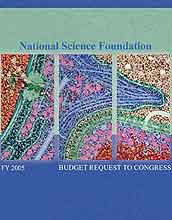|

Press Release 04-012
NSF Fiscal 2005 Budget Request Is $5.745 Billion

February 2, 2004
Arlington, Va.—The National Science Foundation (NSF) today submitted to Congress a $5.745 billion budget request for fiscal year 2005. Foundation Director Rita Colwell says the funds will "address frontiers of knowledge and innovation that will strengthen economic growth and prosperity nationally." The 3 percent overall increase above the fiscal 2004 amount the president recently signed into law will allow NSF to continue support of its integrative research and education investments, Colwell stated. Further, the 2005 request increases funding specifically for research and related activities by 4.7 percent over the current-year level. Five focused priority areas are slated to receive more than $537 million in 2005. Support for Nanoscale Science and Engineering will increase by 20 percent, while support for Biocomplexity in the Environment, Mathematical Sciences, and Human and Social Dynamics will continue at 2004 levels. The new budget requests $20 million to start NSF's Workforce for the 21st Century priority area, focusing on U.S. citizens and broadening participation. The fiscal 2005 budget also seeks funding for six major research facilities: - $12 million for the National Ecological Observatory Network (NEON), a system of research facilities and instruments for integrated environmental observations at local, regional and continental scales
- $40.85 million to outfit a new state-of-the-art research vessel to support the international Integrated Ocean Drilling Program
- $30 million for the Rare Symmetry Violating Process (RSVP) project at the Brookhaven National Laboratory to clarify the standard model of physics and seek out the particles or processes that help answer questions about the origins of our physical world and the nature of dark matter
- $49.67 million to further support the Atacama Large Millimeter Array in Chile
- $33.45 million for the IceCube Neutrino Observatory at the South Pole
- $47.35 million for Earthscope, a nationwide geological observatory network
The 2005 budget request also includes a 10.7-percent increase in funding for NSF's integrative research and education centers programs, including six new Science and Technology Centers (STC), which raises overall funding for STCs by about $30 million to $72.4 million in 2005. Other major increases will be directed toward chemistry centers, Long Term Ecological Research projects, Mathematical Sciences Research Institutes, Nanoscale Science and Engineering Centers and Centers for Social, Behavioral and Economic Sciences. NSF is also requesting $363 million for Organizational Excellence, a key strategic goal planned for 2005, which agency officials describe as equal and complementary to NSF's other goals of people, ideas and tools. Integrating sound business practices with productive research and education investments brings real returns to the American people. "We have been an innovator in sound business practices, having received the President's Quality Award for Management Excellence and two green-light ratings from OMB for financial management and e-government," Colwell said. "Yet, for the past two decades—not years—we have kept the same basic staffing level despite significant increases in workload, steadily rising numbers of proposals and greater numbers of high-dollar, multidisciplinary projects that require sophisticated monitoring and evaluation." In particular, the increased investment will help upgrade NSF's operational systems to ensure their continued reliability, security, and user friendliness, she said. Overall, Colwell concluded, great care was taken to identify, during a tight budget year, investments that have enduring benefits for science and engineering communities as well as the American public.
-NSF-

Media Contacts
Bill Noxon, NSF (703) 292-7750 wnoxon@nsf.gov
Program Contacts
Tom Cooley, NSF (703) 292-8200 tcooley@nsf.gov
Related Websites
NSF Budget Request: http://www.nsf.gov/about/budget/fy2005/
Statement by NSF Director Rita R. Colwell: http://www.nsf.gov/news/speeches/colwell/rc040202fy05budget.htm
Remarks by NSF Director Rita R. Colwell: http://www.nsf.gov/news/speeches/colwell/rc040203fy05budget.htm
Fiscal 2005 Budget Request Slides: http://www.nsf.gov/news/speeches/colwell/fy2005budget/sld001.htm
Backgrounder: NSF Fiscal 2005 Budget Priority Areas: http://www.nsf.gov/news/news_summ.jsp?cntn_id=100604
Factsheet: National Science Foundation: http://www.nsf.gov/news/news_summ.jsp?cntn_id=100595

The National Science Foundation (NSF) is an independent federal agency that supports fundamental research and education across all fields of science and engineering. In fiscal year (FY) 2009, its budget is $9.5 billion, which includes $3.0 billion provided through the American Recovery and Reinvestment Act. NSF funds reach all 50 states through grants to over 1,900 universities and institutions. Each year, NSF receives about 44,400 competitive requests for funding, and makes over 11,500 new funding awards. NSF also awards over $400 million in professional and service contracts yearly.
 Get News Updates by Email Get News Updates by Email
Useful NSF Web Sites:
NSF Home Page: http://www.nsf.gov
NSF News: http://www.nsf.gov/news/
For the News Media: http://www.nsf.gov/news/newsroom.jsp
Science and Engineering Statistics: http://www.nsf.gov/statistics/
Awards Searches: http://www.nsf.gov/awardsearch/
| 

